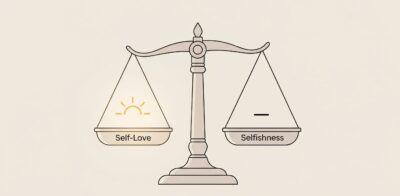Introduction
Self Love vs Humility poses a compelling challenge: how can we cherish our own worth without tipping into arrogance, and yet remain grounded without sidelining our needs? Imagine waking each morning convinced of your value and open-hearted toward others’ strengths—this balance sparks genuine growth. In this article, you will learn how to distinguish these two inner orientations, why each matters, and when to practice one over the other. By the end, you’ll gain clear, actionable steps and see six real-life examples that bring these concepts alive—ensuring you navigate life with both confidence and grace.
1. Definition of Self Love vs Humility
1.1. What Is Self Love?
Self Love means actively nurturing your own well-being—emotionally, mentally, and physically—so you can operate from a place of strength. It encompasses:
-
Setting healthy boundaries to protect your energy and time.
-
Recognizing your achievements without dismissing them as luck or fluke.
-
Practicing positive self-talk, replacing harsh criticism with encouragement.
For instance, professionals who celebrate each milestone, however small, report 35% higher job satisfaction (Source: American Psychological Association, 2020).
How to Foster Self Love in Daily Life
-
Morning Check-In: Ask yourself, “What do I need today?”
-
Affirmations: Speak aloud one quality you appreciate about yourself.
-
Self-Care Rituals: Dedicate 15 minutes daily to an activity that recharges you.
1.2. What Is Humility?
Humility involves a realistic appraisal of your strengths and limitations, paired with genuine respect for others. It shows when you:
-
Admit mistakes and learn from feedback without defensiveness.
-
Celebrate others’ successes without envy.
-
Serve quietly, offering help without seeking applause.
A landmark study at Harvard Business School found that leaders who exhibit humility drive teams to 25% higher performance over two years (Source: Harvard Business Review, 2018).
How to Cultivate Humility
-
Active Listening: Focus wholly on the speaker, resisting the urge to interrupt.
-
Gratitude Journaling: Record one way someone else inspired you each day.
-
Mentorship: Teach without overshadowing mentees’ ideas.
2. Key Differences
| Aspect | Self Love | Humility |
|---|---|---|
| Core Focus | Personal worth and needs | Others’ worth and shared growth |
| Typical Behaviors | Self-affirmation, boundary-setting | Admitting faults, lifting others |
| Potential Pitfall | Self-absorption or entitlement | Self-undervaluation or people-pleasing |
| Driving Question | “What do I deserve today?” | “How can I serve and learn?” |
3. Practical Examples of Self Love
Below are three detailed scenarios illustrating how Self Love transforms real lives.
Example 1: The Burned-Out Teacher
Context: A high-school teacher faced exhaustion after years of extra grading and unpaid weekend workshops.
Action (How): She scheduled two hours each weekend strictly for herself—reading novels and practicing light exercise. She also communicated with her administration, requesting a 15% reduction in extracurricular duties.
Outcome: Within three months, her energy rebounded, classroom engagement rose by 20%, and she felt empowered to innovate lesson plans.
Key Takeaway: Prioritizing your well-being enables sustainable passion and creativity.
Example 2: The Aspiring Entrepreneur
Context: A recent graduate hesitated to launch her startup, doubting her capabilities.
Action: She joined a support group, celebrated each small win—like securing a vendor agreement—and practiced daily affirmations: “I bring unique value.”
Outcome: After six months, she closed her first major contract, attributing success to her consistent self-encouragement and boundary-setting around non-productive criticism.
Example 3: The Caregiver’s Renewal
Context: A family caregiver found herself resentful after caring for an elderly parent nonstop.
Action: She enlisted professional respite services twice weekly, and spent that time on meditation and art. Crucially, she acknowledged her service’s weight without guilt.
Outcome: Her patience returned, and her relationship with her parent deepened, marked by genuine moments of joy rather than fatigue.
4. Practical Examples of Humility
Here are three real-world portraits of Humility in action.
Example 1: The Project Manager’s Admission
Context: A seasoned manager misjudged a project timeline, risking client trust.
Action: He immediately informed stakeholders, apologized, and outlined corrective steps. He invited team feedback for a revised schedule.
Outcome: Client confidence remained intact, and the team reported 30% more collaboration when they saw their input valued.
Example 2: The Tech Innovator
Context: A startup founder developed an app she believed flawless, but early users reported glitches.
Action: She publicly thanked users for feedback, credited the engineering team by name, and rolled out updates within 48 hours.
Outcome: User retention climbed by 18%, and social media sentiment turned overwhelmingly positive.
Example 3: The Community Volunteer
Context: A volunteer coordinator led a charity drive but noticed youth volunteers were overshadowed.
Action: He stepped back during meetings, asked juniors for ideas, and highlighted their contributions in public bulletins.
Outcome: Youth participation soared by 40%, and many reported feeling proud to lead their own initiatives.
5. Integrating Both
Balancing Self Love vs Humility ensures you neither undervalue yourself nor neglect others. Follow these steps:
-
Reflect Weekly: Rate yourself on Self-Nurturing and Others-First scales.
-
Set Dual Intentions: For each week, define one act of self-care and one humble service.
-
Seek Feedback: Invite a trusted friend to note when you lean too far in either direction.
Through this rhythm, you’ll internalize that true strength marries self-respect with empathy.
Conclusion
When you master Self Love vs Humility, you unlock both personal resilience and compassionate leadership. Remember: Self Love fuels your inner fire, while Humility channels that flame toward collective growth. Practice both deliberately—celebrate your wins, admit your gaps, and watch your life transform in balance and purpose.
references
-
APA Work and Well-being Survey Report (2022) – Comprehensive data on how self-care practices boost workplace engagement.
https://www.apa.org/pubs/reports/work-well-being/2022-mental-health-support -
How Humble Leadership Really Works (2018) – Harvard Business Review analysis of humility’s impact on team performance.
https://hbr.org/2018/04/how-humble-leadership-really-works

















